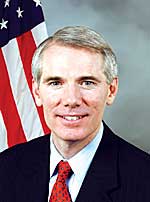
Our biggest body of water and the most popular location for Ohio fishing, boating and other recreation is Lake Erie.
In many respects, the Lake Erie ecosystem is healthier today than it was 40 or 50 years ago, but there are a number of threats, old and new, that must be addressed.
I’ve been working with stakeholders in the region to protect and preserve this invaluable water resource for generations to come.
Invasive species have significantly altered the ecosystem of the lake over the last two centuries. According to the U.S. Environmental Protection Agency, at least 25 non-native species of fish have entered the Great Lakes since the 1800s, including round goby, sea lamprey, Eurasian ruffe and alewife. Non-native plants and mollusks, including zebra mussels, have also caused trouble by displacing native populations.
Recently I’ve teamed up with my colleague from across the aisle, Sen. Debbie Stabenow of Michigan, to protect the Great Lakes from invasive fish species like Asian carp.
Among other things, our legislation requires the Army Corps of Engineers to accelerate a comprehensive study to permanently block Asian carp, helping ensure a cost-effective solution is reached before it’s too late.
Our efforts have been endorsed by the Toledo Blade, which called our bill “bipartisan legislation that could help block a carp invasion.” The Columbus Dispatch and Pittsburgh Post-Gazette have also praised the bill.
Too often, a false choice is created by folks who say we can only protect the lake on the one hand, or encourage commerce on the other. If we are thoughtful about it, there’s no reason we can’t do both together.
As an example, the lake is big enough for excellent recreational fishing and boating and commercial shipping. Maritime commerce on the Great Lakes is important to job creation in the entire region, driving $33.5 billion worth of economic activity annually and supporting 227,000 jobs.
Shipping traffic has been on the upswing in recent years with steel mills operating at a high capacity, partly due to demand for steel piping from the oil and gas producers operating in shale formations like the Utica and Marcellus.
That’s why I’ve also introduced a commonsense bill to encourage shipping by reforming the Harbor Maintenance Tax for smaller, container ships.
It exempts container ships from paying the tax when they bring goods into our Ohio ports from Canada or other U.S. ports in the St. Lawrence Seaway System. The tax pays for the dredging of deeper and wider shipping channels, but container ships are lighter and sit higher in the water, and don’t use those channels. One shipper says they would like to bring containers to Cleveland from Montreal, but the high taxes keep them from doing so.
This step will help spur economic growth in Cleveland by maximizing the city’s location on Lake Erie and taking advantage of this new mode of transporting goods. It will also lead to less congestion on roads and rail, as well as less pollution.
At the same time, we need to make sure that the Harbor Maintenance Tax revenues that come in from the bigger, bulk freight shippers are in fact used for harbor maintenance, which unfortunately hasn’t always been the case. I’ve co-sponsored a bipartisan bill that ensures that Washington doesn’t siphon off the Harbor Maintenance Trust Fund to finance other projects.
Currently the Harbor Maintenance Trust Fund has a surplus of $5.65 billion. It’s collecting $1.6 billion per year, but spends less than $800 million annually. Yet decades of inadequate dredging have reduced the efficiency of Great Lakes ports, reducing the carrying capacity of vessels by 10 percent or more, which drives up the cost of shipping as well as raises the chances of a ship grounding or a collision.
There’s another problem we have to deal with when it comes to the Port of Cleveland: The disposal facilities that the Army Corps uses for the dredged material will likely reach full capacity in the near future. I’ve been working with the Army Corps, the City of Cleveland and the Port Authority to find alternatives that will expand the capacity of the disposal facilities in an environmentally safe way.
By fighting the threats from Asian carp, eliminating an unfair tax burden on container ships, making sure Washington uses our tax dollars responsibly, and solving the dredging crisis, we’ll keep Lake Erie an important recreational and commercial resource — and source of pride — for all Ohioans.
Rob Portman is a United States Senator from Ohio.
